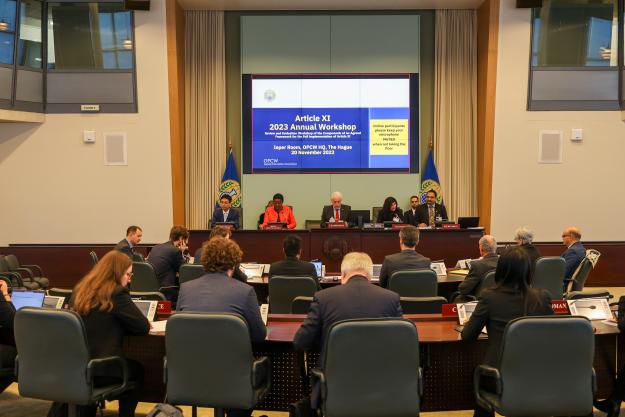
THE HAGUE, Netherlands—21 November 2023—Twenty-six Member States of the Organisation for the Prohibition of Chemical Weapons (OPCW) participated in the eighth edition of the annual Review and Evaluation Workshop of the Components of an Agreed Framework for the Full Implementation of Article XI of the Chemical Weapons Convention (CWC) on 20 November 2023 at the OPCW’s Headquarters in The Hague, Netherlands.
The annual workshop encourages economic and technological development in Member States through free participation in the exchange of chemicals, equipment, and scientific and technical information for the peaceful uses of chemistry.
OPCW Deputy Director-General, Ambassador Odette Melono, and the Ambassador, Permanent Representative of Romania to the OPCW and Chairperson of the Executive Council, H.E. Mr Lucian Fătu, opened the meeting in the presence of the Article XI Facilitator, Ms Fatima Hamdia Tanweer.
“Article XI is more than a mere treaty provision in the Chemical Weapons Convention; it is the embodiment of the principle that chemistry should be used exclusively for the benefit of mankind and not for its destruction. It underscores the conviction that peace, security, and development can be achieved through international cooperation and the fostering of the peaceful uses of chemistry,” said the OPCW Deputy Director-General in her opening remarks.
“The Organisation’s efforts and activities under Article XI build confidence in the work of the OPCW and in the Convention, while ensuring that all States Parties benefit from their membership,” she underlined.
Ambassador Fătu stated: “Ensuring that the ban on chemical weapons is upheld, while promoting and facilitating the exchange of knowledge and trade of chemicals for peaceful purposes to support the development in Member States, is a very delicate balancing act. Therefore, fostering the peaceful applications of chemistry represents the main element when we talk about the significance of Article XI.”
The workshop discussed ongoing capacity-building efforts under Article XI towards fostering economic and technological development in Member States as well as the impact of Article XI programmes and activities. Experts from various fields, including academia, national authorities, government agencies, chemical industry association, and the private sector, delivered presentations on the three strategic areas in focus under Article XI:
- integrated chemicals management;
- enhancing laboratory capabilities;
- promoting chemical knowledge.
OPCW staff briefed participants on the Organisation’s capacity-building programmes in all thematic areas. They also gave an overview of the recent impact review study on the OPCW Analytical Skills Development Courses from 2019 to 2022, as well as capacity-building courses planned for 2024.
During the workshop, participants engaged in thematic breakout groups to share ideas, lessons learnt, and best practices related to the implementation of Article XI. They also discussed measures aimed at promoting and strengthening OPCW international cooperation programmes in this regard.
The workshop was attended by over 40 representatives from 26 OPCW Member States, including officials from National Authorities and Permanent Representations: Algeria, Bangladesh, Bolivia, Brazil, Burundi, Colombia, China, Cuba, Finland, France, Germany, Guatemala, India, Japan, Laos, Mongolia, Nigeria, Pakistan, Paraguay, Peru, Romania, Russian Federation, Serbia, South Africa, Tunisia, United States of America.
Background
The Review and Evaluation Workshop of the Components of an Agreed Framework for the Full Implementation of Article XI has been designed to support the implementation of the Decision “Components of an Agreed Framework for the Full Implementation of Article XI of the Chemical Weapons Convention” (C 16/DEC.10, dated 1 December 2011). The decision refers to key measures to be undertaken to implement Article XI, including capacity building, networking, facilitation of international cooperation.
Based on the outcomes of the first workshop, four regional Article XI workshops were held in Asia, Latin America and the Caribbean region, Eastern Europe and Africa in 2012 and 2013 to discuss challenges related to the Article XI implementation in different regions. Another workshop was organised in 2014 to explore ideas that could help develop concrete measures to fully implement Article XI.
The first global Review and Evaluation Workshop for Article XI was organised in 2016 and has since occurred annually.
As the implementing body for the Chemical Weapons Convention, the OPCW, with its 193 Member States, oversees the global endeavour to permanently eliminate chemical weapons. Since the Convention’s entry into force in 1997, it is the most successful disarmament treaty eliminating an entire class of weapons of mass destruction.
On 7 July 2023, the OPCW verified that all chemical weapons stockpiles declared by the 193 States Parties to the Chemical Weapons Convention since 1997 — totalling 72,304 metric tonnes of chemical agents — have been irreversibly destroyed under the OPCW’s strict verification regime.
For its extensive efforts in eliminating chemical weapons, the OPCW received the 2013 Nobel Peace Prize.
